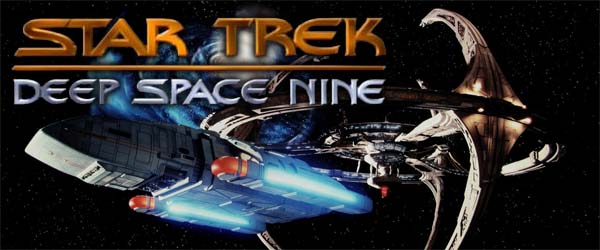
In the age of streaming and binge-watching here in the year 2023, long-form serialized television is now ubiquitous. Every network and streaming service has wanted its own blockbuster TV shows. Whether it's AMC's The Walking Dead and Breaking Bad, HBO's Game of Thrones, Sci-Fi's Battlestar Galactica, Netflix's House of Cards and Stranger Things, History's Vikings, and so forth, it seems that every big new show outside of sit-coms has a heavily-serialized format. Procedural dramas are going the way of the dinosaur.
Serialized, long-form television may be commonplace now, but back in the 1990's, it was virtually unheard of outside of daytime soap operas (such as Dallas and Dynasty) and the occasional network mini-series. At least, this was the case in the United States. British television has a much longer track record of serialized story-telling. A big part of why serialized television was uncommon was that the producer(s) of network syndicacted shows didn't have as much control over when its affiliates decided to air the shows, or how heavily they would market and advertise it. Furthermore, the networks or affiliates could change the time slot of the show pretty much at a whim. Viewership, therefore, would be much more fickle and fractured. Audiences would pop in and drop out. Expecting the audience to have seen every previous episode in preparation for this week's episode was a dangerous and risky expectation for a production studio. It's easy to lose viewers if none of them know what's going on.
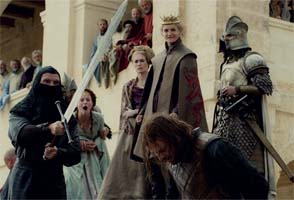 - Game Of Thrones, copyright HBO
- Game Of Thrones, copyright HBO
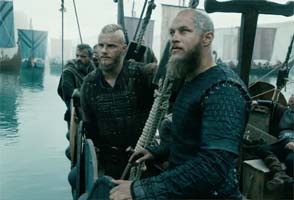 - Vikings, copyright History Channel
- Vikings, copyright History Channel
Highly serialized, long-form drama are the norm for modern networks and subscription television services.
As I mentioned in the previous essay, this was the case with me. I was in elementary school and middle school during DS9's run, and I missed a lot of episodes in the first couple seasons, despite wanting to watch the show. Missing so many episodes meant that I had very little idea what was going on when I would watch, and so I mostly lost interest in the show. If my dad was watching it, and I was there, I'd watch it, but I wasn't planning my day around it.
Looking back now, that sort of serialized story-telling is now ubiquitous and expected, and so it's easier to recognize that Deep Space Nine was truly innovative and ahead of its time in this regard.
Long-form story-telling
Serialized story-telling wasn't alien to Star Trek. Deep Space Nine premiered in 1993, the same year as the sixth season of Next Generation. By this time, The Next Generation had several story threads that had recurred over the course of a season, or over multiple seasons -- as well as several attempted overarching plot threads that were dropped.
As early as the first season of Next Generation, Q had become a recurring antagonist, and his "judgement" over the human race was established as a recurring plot thread. Heck Q's judgement of humanity was originally depicted as the framing mechanism for the entire show! It was scaled back in the following seasons due to the general poor reception of the first season, and the fact that John de Lancie just works better in a more whimsical and comic role.
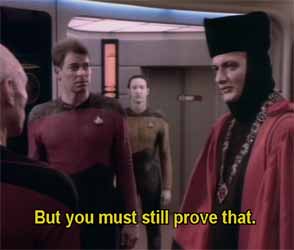 - TNG "Encounter At Farpoint", season 1, episode 1
- TNG "Encounter At Farpoint", season 1, episode 1
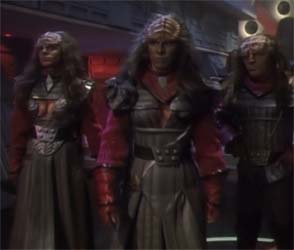 - TNG "Redemption, Part I", season 4, episode 26
- TNG "Redemption, Part I", season 4, episode 26
TNG had several recurring plot threads.
The final two episodes of Next Generation's first season, "Conspiracy" and "The Neutral Zone", seem to have been part of an abandoned attempt at more long-form story-telling. Both seem to be trying to establish some new threat to the Federation (and possibly a shared threat between the Federation and other rival powers such as the Romulans). I think the original idea was for this to become an overarching storyline for the entire series. But the thread from "Conspiracy" was completely dropped, and the destroyed colonies referenced in "The Neutral Zone" were re-written to be retroactive foreshadowing of the Borg's appearance in season 2.
[More]
cddb26c9-ca5a-4327-b199-d0d00dec522b|0|.0
Tags:Star Trek, Star Trek: Deep Space Nine, Federation, Starfleet, progressivism, humanism, secularism, religion, fundamentalism, fascism, terrorism, war, trans-gender, Worf, Odo, Quark, Moogie, Ishka, Bajor, Dominion, Founder, Changeling, Jem'Hadar, Cardassian, streaming television, Game of Thrones, Battlestar Galactica, the X-Files, Babylon 5, Buffy the Vampire Slayer, The Sopranos, Lost, Twin Peaks
I'll be honest. I almost didn't even bother to watch the third season of Star Trek: Picard. The first 2 seasons were so bad that the thought of watching another season almost made me physically ill. It was bad enough to have beloved characters like Picard, Seven of Nine, Hugh, and Q treated the way that they were, but now season 3 threatened to treat the entire cast of Next Generation with the same level of disrespect. It was not something that I wanted to willingly subject myself to.
Even after I saw some positive reactions to the first couple episodes, I still didn't bother watching. After all, the first episode or 2 of both of the previous seasons received generally positive reviews before nose-diving off the deep end into a pool of shit. But then the season reached the halfway mark, and I was still seeing almost entirely positive buzz surrounding it -- and not just from a few shill social media influencers, but from pretty much everybody. At that point, my partner started expressing interest in watching it, so I finally caved and started watching, with a bottle of Excedrin next to me, just in case.
I kept my guard up throughout the first few episode. I fully expected that it would start off relatively strong before inevitably tripping over its own 2 feet. But that kind of ... never really happens this time around. Yes, there is a big "mystery box" tease throughout the show that had the hallmarks of J.J. Abrams and Alex Kurtzman plastered all over it, and that had me very worried for where things would end up. And yes, that mystery box does turn out to be an 11th-hour bait-and-switch.
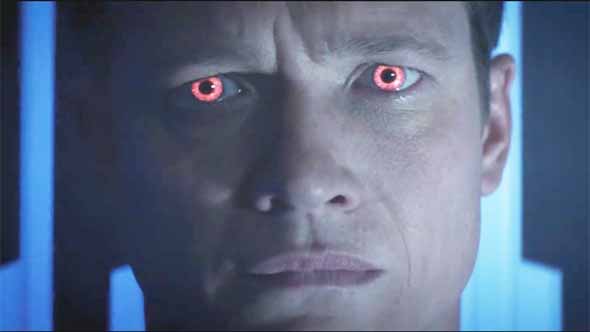 © CBS, Paramount
© CBS, Paramount
The "Mystery Box" of Jack Crusher had Alex Kurtzman's fingerprints all over it.
But even though the bait-and-switch plot-twist ends up being about as silly as anything that was in the previous 2 seasons, this one actually kind of works. It's something that is actually quite clearly telegraphed throughout the entire show, starting from the opening scenes. But it also has some clever mis-direction and red-herrings to keep the twist from ever feeling truly certain. And instead of being something pulled out of the writers' asses (like robot tentacle-monsters from another dimension), this twist is something that is both firmly grounded in Star Trek history and lore, and which logically follows from previous series.
It's almost like the people who wrote this season of Picard actually, like, I don't know, watched some episodes of Star Trek before coming up with this plot.
It ends up making a world of difference. I'm still not "in love" with Star Trek: Picard season 3. I don't think it is particularly great "Star Trek". It still falls firmly into the category of "Dark Trek", and is still about vengeful bad guys with super-weapons. But it is at least competently-plotted and scripted this time around. It is tightly themed, is loaded with set-ups and pay-offs, and shows our characters growing an changing in ways that are consistent with their original characterizations. Season 3 of Picard is basically an extended Next Generation movie, and it's definitely better than Nemesis, and probably at least as good as any of the other Next Generation movies (keeping in mind that I'm not a big fan of First Contact). [More]
I always thought that The Last of Us was an overrated video game. It was good, sure, don't get me wrong. But I never thought that it was the "pinnacle of story-telling in gaming", as many of its biggest fans suggested. To me, it was a good zombie story about the risk of closing ourselves off from each other, which was stapled to a good cover-based shooter. But, to me, the whole always felt like less than the sum of its parts. The gameplay of The Last Of Us was always more about setting a tone than about telling the story. And if your gameplay isn't helping to tell the story, then, as far as I'm concerned, you're not a particularly good example of the interactive video game medium.
So when HBO announced that it would be producing a TV mini-series adapting The Last Of Us, my initial reaction was "why bother?". Like with so many modern remakes, reboots, and adaptations of barely 10-year-old media, I felt like the original is fine, and if you want to watch a Last Of Us movie, you could just hop on YouTube and watch a compilation of all the cutscenes. Honestly, you wouldn't be missing much by ignoring any of the actual game -- let alone by not playing it yourself.
Very little of The Last Of Us' gameplay informed the story in any meaningful way.
Well, HBO's streaming series manages to simultaneously vindicate that feeling, while also showcasing that The Last Of Us does actually benefit from being adapted into the medium that it was always better suited for anyway. The creators of the video game, themselves, in adapting the game, basically cut out all of the actual video game. Virtually nothing that the player ever has to do in The Last of Us was translated to the TV show. It's as if all the actual video game was never really important at all to telling the story. The TV show basically adapts all the cutscenes, telling the same basic story -- sometimes better than the game did -- and without all the meddlesome video game getting in the way.
In the entire 10-episode mini-series, there is [I think] two scenes of our characters having to sneak past infected -- one of which is a flashback. And not a single one of the multitude of scenes in which Joel and Ellie are ambushed by random raiders is adapted at all. Seriously, the characters keep talking about how dangerous it is outside of the quarantined cities because of raiders, but yet we never once see any actual raiders. The closest we come is the ambush by the revolutionaries in Kansas City. Then there are a couple scenes of Joel and Ellie getting ladders or unlocking doors for each other, which was about the only part of the game that ever contributed to the story-telling by reinforcing the relationship and growing inter-dependence of the characters.
Under most circumstances, I would say that adapting a game by cutting out so much of the game would be a "bad thing". In this case, however, it isn't. It might actually be an improvement. I always felt like the bulk of the gameplay in The Last Of Us was just filler anyway. All the actual story -- all the stuff that everybody remembers and loves -- happens outside of the player's control.
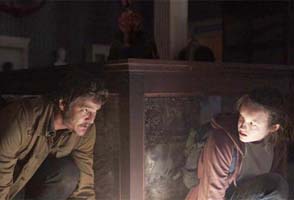 The Last Of Us Episode 2, © HBO, Sony Television.
The Last Of Us Episode 2, © HBO, Sony Television.
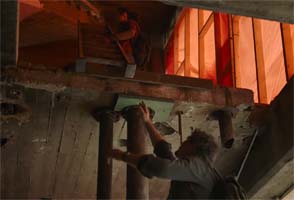 The Last Of Us Episode 9, © HBO, Sony Television.
The Last Of Us Episode 9, © HBO, Sony Television.
Very little of The Last Of Us' gameplay was adapted into the TV show.
The growing fungal threat
The TV mini-series doesn't only cut gameplay content out; it also adds quite a bit new story, and changes things here and there. There are a lot of flashbacks to the days before the outbreak, and to the early days of the outbreak. These serve to provide additional characterization for Sarah, in order to make her a more fully-fleshed out character. It also provides backstory regarding the origin of the mutated cordyceps, and why Ellie is immune.
When The Last of Us released back in 2013, the idea of a cordyceps apocalypse was kind of laughable. Fungi can infect insects, but they cannot survive in the warmer bodies of mammals. The worst that humans have to worry about is topical infections like athlete's foot or yeast infections.
However, as the show points out in its opening minutes, there is actual growing concern from infectious disease experts that climate change could actually cause fungi to become a serious infectious hazard to humans. The reason for this is that the rising temperatures of the Earth (due to human-induced climate change) is causing many fungal species to adapt to warmer temperatures. Even just adding a couple extra degrees of temperature tolerance would be enough for certain fungi to survive in the warm-blooded bodies of mammals and cause serious illness. Cordyceps would need a lot more mutation than just a couple extra degrees of temperature tolerance in order for it to become a threat to humans, but other fungi (such as the yeast Candida Auris) have already begun causing serious illness to humans. [More]
0d94fce5-da5d-42fb-b476-9fdd748b75d8|5|3.6
Tags:fungus, The Last of Us, HBO, HBO Max, streaming television, Pedro Pascal, Bella Ramsey, Nick Offerman, zombie, cordyceps, fungus
I admit, I only kind of half pay attention to the new Star Wars and Marvel shows on Disney Plus. Both have so thoroughly over-saturated the market that there's just no excitement about either franchise anymore. A lot of the stories in Star Wars in particular feel like they're scraping the bottom of the barrel for any idea that some bean-counter feels is worth filming. Marvel at least has the advantage of progressing a continuous narrative forward, even if it's currently moving at a glacial pace. Star Wars is widely regarded as having shat the bed with the sequel trilogy (I still haven't bothered to watch Rise of Skywalker), so now it's completely fixated on just back-filling the details adjacent to the parts of the franchise that were actually good, while insisting that the same handful of characters have their hands in everything important that has ever happened in this universe. Anyway, sorry for the Star Wars tangent; I'm supposed to be talking about a Marvel show right now. I wonder how long it will be before Disney gets so desperate that they start crossing-over Marvel and Star Wars?
Anyway, the point is that I've been kind of "meh" about almost everything that Marvel has put out since Infinity War. So "meh" that I couldn't even be bothered to write reviews or impressions of most of it. So much of the content just feels like it's running in place from a narrative standpoint, or that it's just an elaborate setup and tease for bigger, more important future content. Just get to the Fantastic 4 and X-Men and Kang the Conqueror or Dr. Doom or whoever the next big bad Thanos-wannabe is going to be already!
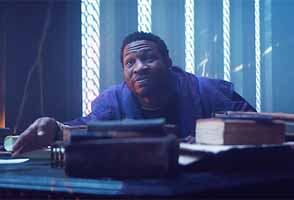 Loki Episode 6, © Disney, Marvel.
Loki Episode 6, © Disney, Marvel.
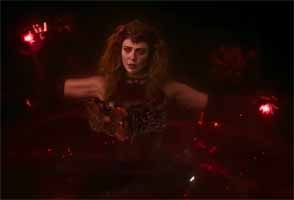 WandaVision Episode 9, © Disney, Marvel.
WandaVision Episode 9, © Disney, Marvel.
Marvel's shows feel largely like teases for the good stuff that's still just over the horizon.
I went into She-Hulk expecting more of the same: a show that serves only to bridge the gap between Endgame and whatever is next, instead of really being a story in its own right. But after a couple episodes of only half watching, I found myself putting my laptop away and actually paying attention as we got further and further into the season. The reason is that She-Hulk doesn't feel like filler content; it feels like an actual TV show that exists for its own sake and is content to tell its own story.
Yeah, sure, it's still tied into what's going on in the broader Marvel universe. OG Hulk gets kid-napped by aliens and disappears for most of the series, which is definitely a tease for some bigger things happening out in the periphery. But while shows like Loki seemed to exist only to build some interest and intrigue about what's going to happen next, She-Hulk is just a show about Jennifer Walters coming to terms with her new, public identity as She-Hulk.
This leads to a more personal, intimate super hero story than I'm used to seeing from the never-ending parade of comic book movies that always have to have apocalyptic stakes. Yeah, sure, Spider-Man deals heavily with Peter Parker balancing his personal and social life with his hero duties, but the focus on teenage and high school drama isn't something that I relate to as much anymore. And yeah, both WandaVision and Loki get very personal, but neither of those allow us to see the heroes living their lives in real life. They both take place in highly exaggerated or outright fictional realities. So She-Hulk feels different. It's largely about Jennifer Walters' life now that she is a super hero. Not her life as a super hero; her normal, everyday life since becoming a super hero. [More]
The first season of The Mandalorian seems to have unnecessarily gotten my hopes up for the future of Star Wars on Disney+. Every Star Wars show since has been a disappointment to some degree, with the possible exception of The Bad Batch (which I never got around to finishing). At best, they have been watchably acceptable. At worst, they've been boring slogs.
Call in the fan service calvalry!
The 2nd season of Mandalorian falls into the "acceptable" category, though it was a substantial decline from the first season. I like Mandalorian's first season specifically because it felt new and fresh, and wasn't reliant on excessive fan service. It expanded the Star Wars universe, instead of making it feel like there's nothing going on beyond Emperor Palpatine and the Jedi. But we knew that Mando was looking to dump The Child off on a Jedi, so it was eventually going to intersect back with Jedi storylines eventually.
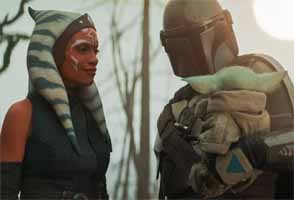 The Mandalorian © Walt Disney Corp.
The Mandalorian © Walt Disney Corp.
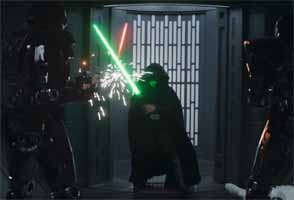 The Mandalorian © Walt Disney Corp.
The Mandalorian © Walt Disney Corp.
It should have been obvious that Mando's storyline would eventually intersect with Ahsoka and/or Luke.
And that's exactly what happened in season 2. I was OK with the appearance of Ahsoka and Luke. Mando was, after all, looking for Jedi, and as far as Star Wars fans know, they are the only 2 Jedi left alive in the galaxy. So of course Mando was going to find one, the other, or both of them. Ahsoka herself was a really cool character who was well cast. Her cameo was about the only one that I genuinely enjoyed, in large part because the episode that she was in is one of the strongest episodes of the season. Luke showing up as a deus ex machina at the last minute to save the day was frustratingly cliche, but tolerably so.
And that wasn't even the end of fan service cameos in Mandalorian season 2. This one season also threw in R2-D2, Bo Katan, Boba Fett, and Dark Troopers. Forgive me if I missed anything. It was ... a lot.
On the other end of the spectrum, is The Book of Boba Fett, which is all fan service all the time. Boba's appearance in season 2 of Mandalorian was, in my opinion, the worst part of Mandalorian. When rumors of Disney wanting to make a show about a Mandalorian bounty hunter started going around, it was assumed that the show would be about Boba Fett. I hated the idea. Boba Fett should have stayed dead. When it was revealed that the show would be about a different, new Mandalorian character, I was less annoyed. I was relieved that it wasn't more Star Wars fan-fic circle-jerking.
[More]
b15ed1a9-b8c3-476d-9ff5-6da1052450b6|1|5.0
Tags:Star Wars, Disney Plus, streaming television, The Mandalorian, Book of Boba Fett, Obi-Wan Kenobi, Boba Fett, Bad Batch, Grogu, Ahsoka Tano, Luke Skywalker, Bo Katan, Darth Vader, Cad Bane, Grand Inquisitor, Third Sister, plot armor
|

| 12 | | | | | | | 60 | | 11 | | | | | | | 55 | | 10 | | | | | | | 50 | | 09 | | | | | | | 45 | | 08 | | | | | | | 40 | | 07 | | | | | | | 35 | | 06 | | | | | | | 30 | | 05 | | | | | | | 25 | | 04 | | | | | | | 20 | | 03 | | | | | | | 15 | | 02 | | | | | | | 10 | | 01 | | | | | | | 05 |
|